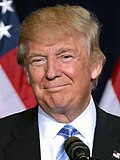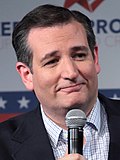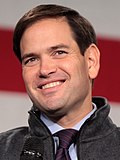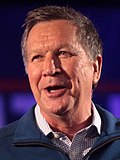2016 Republican Party presidential primaries
The 2016 Republican Party presidential primaries and caucuses were held between February 1 and June 7, 2016. Sanctioned by the Republican Party, this series of elections selected the 2,472 delegates to the Republican National Convention, which selected the Republican Party's nominee for President of the United States.
| |||||||||||||||||||||||||||||||||||||||||||||||
2,472 delegates to the Republican National Convention 1,237 delegate votes needed to win | |||||||||||||||||||||||||||||||||||||||||||||||
|---|---|---|---|---|---|---|---|---|---|---|---|---|---|---|---|---|---|---|---|---|---|---|---|---|---|---|---|---|---|---|---|---|---|---|---|---|---|---|---|---|---|---|---|---|---|---|---|
| |||||||||||||||||||||||||||||||||||||||||||||||
 First place by first-instance vote
| |||||||||||||||||||||||||||||||||||||||||||||||
| |||||||||||||||||||||||||||||||||||||||||||||||
On May 4, 2016, Donald Trump of New York became the presumptive nominee after his remaining challengers Ted Cruz of Texas and John Kasich of Ohio dropped out.[2][3]
Nominee
changeNominee
change|
| |||||||||||||||||||||||||||
| Donald Trump | Mike Pence | ||||||||||||||||||||||||||
|---|---|---|---|---|---|---|---|---|---|---|---|---|---|---|---|---|---|---|---|---|---|---|---|---|---|---|---|
| for President | for Vice President | ||||||||||||||||||||||||||
| Chairman of The Trump Organization (1971-2017) |
Governor of Indiana (2013-2017) | ||||||||||||||||||||||||||
| Campaign | |||||||||||||||||||||||||||
Candidates
changeOn March 23, 2015, Senator Ted Cruz of Texas formally announced his candidacy at Liberty University, and in the following months, sixteen more candidates (bringing the total to 17) entered the race: Former Governor Jeb Bush of Florida, neurosurgeon Ben Carson of Florida, Governor Chris Christie of New Jersey, Senator Ted Cruz of Texas, businesswoman Carly Fiorina of Virginia, Former Governor Jim Gilmore of Virginia, Senator Lindsey Graham of South Carolina, Former Governor Mike Huckabee of Arkansas, Governor Bobby Jindal of Louisiana, Governor John Kasich of Ohio, Former Governor George Pataki of New York, Senator Rand Paul of Kentucky, Former Governor Rick Perry of Texas, Senator Marco Rubio of Florida, Former Senator Rick Santorum of Pennsylvania, businessman Donald Trump of New York, and Governor Scott Walker of Wisconsin.
The total of 17 candidates makes it the 2nd largest presidential candidate field for any single political party in American history.[4]
Before the Iowa caucuses on February 1, candidates Perry, Walker, Jindal, Graham, and Pataki withdrew due to low polling numbers. While leading many polls entering the Iowa caucuses, Trump came in second behind Senator Cruz. Carson dropped out after Super Tuesday on March 4, 2016.
Money raised
changeThis is an overview of the money used in the campaign as it is reported to Federal Election Committee and released on February 22, 2016. Outside groups are Independent expenditure only committees also called PACs and SuperPACs. Several such groups normally support each candidate but the numbers in the tablet are a total of all of them. This means that a group of committees can be shown as technical insolvent (shown in red) even though it is not the case of all of them.
The Campaign Committees debt are shown in red if the campaign is technical insolvent. The source of all the numbers is Center for Responsive Politics.[5] Jim Gilmore's information is not currently available.
| Candidate | Campaign committee (as of January 31) | Outside groups (as of February 22) | Total spent | Suspended campaign | |||||||||||||||||
|---|---|---|---|---|---|---|---|---|---|---|---|---|---|---|---|---|---|---|---|---|---|
| Money Raised | Money spent | Cash on hand | Debt | Money Raised | Money spent | Cash on hand | |||||||||||||||
| Donald Trump | $25,526,319 | $23,941,598 | $1,584,721 | $17,534,058∗ | $1,894,509 | $1,798,720 | $95,789 | $25,740,318 | Active | ||||||||||||
| Ted Cruz | $54,661,506 | $41,016,086 | $13,645,419 | $0 | $46,726,605 | $21,280,797 | $25,445,808 | $62,296,883 | May 3, 2016 | ||||||||||||
| John Kasich | $8,648,890 | $7,172,247 | $1,476,642 | $0 | $6,729,311 | $10,958,007 | $-4,228,696 | $18,130,254 | May 4, 2016 | ||||||||||||
| Marco Rubio | $34,652,654 | $32,935,702 | $5,055,407 | $98,000 | $34,313,903 | $28,334,553 | $5,979,350 | $61,270,255 | March 15, 2016 | ||||||||||||
| Ben Carson | $57,860,505 | $53,713,834 | $4,146,671 | $0 | $13,807,549 | $13,985,768 | $-178,219 | $67,699,602 | March 4, 2016 | ||||||||||||
| Jeb Bush | $33,512,524 | $30,632,058 | $2,880,466 | $59,136 | $118,740,817 | $94,262,809 | $24,478,008 | $124,894,867 | February 20, 2016 | ||||||||||||
| Chris Christie | $7,995,895 | $7,254,221 | $741,674 | $72,579 | $23,156,157 | $21,849,465 | $1,306,692 | $29,103,686 | February 10, 2016 | ||||||||||||
| Carly Fiorina | $11,848,450 | $8,490,693 | $3,357,756 | $0 | $14,184,857 | $11,768,162 | $2,416,695 | $20,258,855 | February 10, 2016 | ||||||||||||
| Rick Santorum | $1,426,163 | $1,403,380 | $41,966 | $899,356 | $642,416 | $1,032,603 | $-390,187 | $2,435,983 | February 3, 2016 | ||||||||||||
| Rand Paul | $12,158,052 | $11,303,910 | $854,142 | $292,311 | $10,591,125 | $8,160,980 | $2,430,145 | $19,464,891 | February 3, 2016 | ||||||||||||
| Mike Huckabee | $4,114,116 | $4,075,073 | $39,044 | $55,384 | $5,862,475 | $5,820,361 | $42,115 | $9,895,434 | February 1, 2016 | ||||||||||||
| George Pataki | $544,183 | $524,850 | $19,332 | $20,000∗ | $1,547,674 | $1,510,759 | $36,915 | $2,035,609 | December 29, 2015 | ||||||||||||
| Lindsey Graham | $5,629,463 | $5,329,046 | $300,417 | $57,041 | $4,388,304 | $4,279,062 | $109,242 | $9,608,108 | December 21, 2015 | ||||||||||||
| Bobby Jindal | $1,442,464 | $1,442,464 | $0 | $0 | $4,517,207 | $4,517,874 | $-666 | $5,960,337 | November 17, 2015 | ||||||||||||
| Scott Walker | $8,076,155 | $7,996,958 | $79,197 | $1,078,876 | $24,436,318 | $24,393,632 | $42,686 | $32,390,590 | September 21, 2015 | ||||||||||||
| Rick Perry | $1,427,133 | $1,766,819 | $2,403 | $0 | $15,231,068 | $15,356,117 | $-125,050 | $17,122,936 | September 11, 2015 | ||||||||||||
| Active campaigns highlighted in this color | |||||||||||||||||||||
Notes
- ∗This is mainly a personal loan from the candidate to the campaign as part of the candidate's self-financing.
Results
changeAfter the Iowa primaries, candidates Huckabee, Paul and Santorum withdrew due to poor performance at the ballot box. Following the New Hampshire primary, which was a sizable victory for Trump, candidates Christie, Fiorina and Gilmore withdrew. After the conclusion of the South Carolina primary, Bush withdrew from the race following a second win for Trump. Ben Carson dropped out on March 4, 2016. Marco Rubio dropped out on March 15, 2016 after losing to Trump in his home state of Florida. Ted Cruz dropped out on May 3, 2016 after losing to Trump in Indiana.
References
change- ↑ 1.0 1.1 1.2 1.3 1.4 1.5 1.6 1.7 Berg-Andersson, Richard E. "Republican Convention". The Green Papers. Retrieved Aug 10, 2016.
- ↑ "First on CNN: Kasich 'doing the right thing' by dropping out, Trump says". CNN. May 4, 2016. Retrieved September 4, 2017.
- ↑ "John Kasich exits the presidential race, leaving Trump as presumptive nominee". Washington Post. May 4, 2016. Retrieved September 4, 2017.
- ↑ Linshi, Jack. "More People Are Running for Presidential Nomination Than Ever". TIME.com. Retrieved 2016-02-14.
- ↑ "2016 Presidential Race". OpenSecrets.org - Center for Responsive Politics. Retrieved 26 February 2016.
Other websites
change- RNC 2016 Republican Nominating Process Archived 2016-11-08 at the Wayback Machine
- Green papers for 2016 primaries, caucuses, and conventions
- 2016 Presidential primaries Archived 2015-11-17 at the Wayback Machine, ElectionProjection.com



